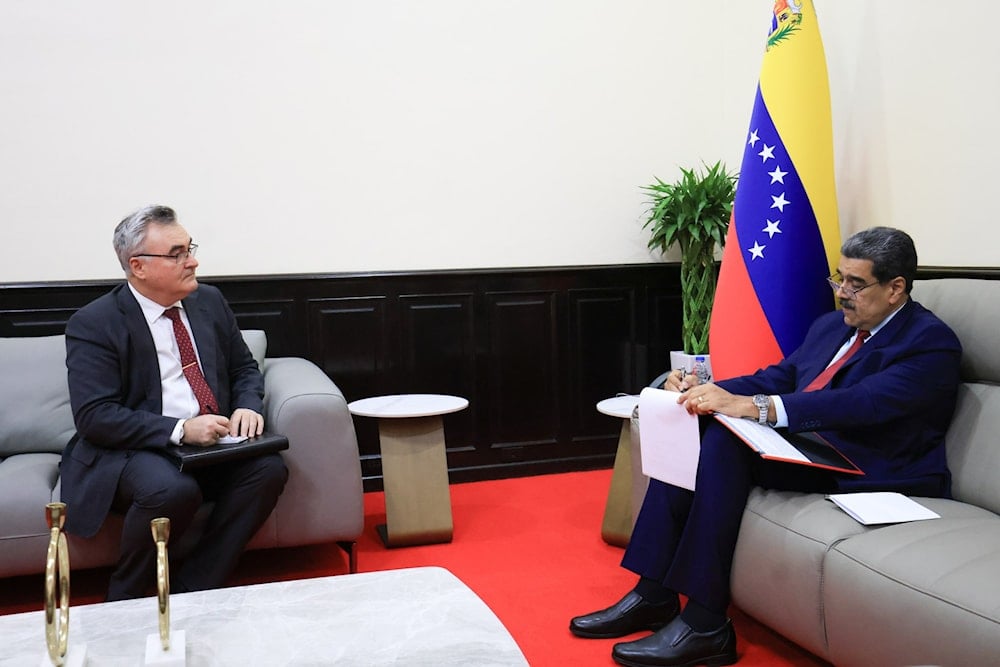Maduro signs law cementing Venezuela-Russia strategic partnership
Venezuela's president has ratified a landmark 10-year strategic partnership treaty with Russia, deepening defense and economic ties.
-

Venezuelan President signs Law on the Strategic Partnership Treaty with Russia at the Miraflores Palace. (Presidential Press)
Venezuelan President Nicolas Maduro has formally enacted a law approving the Treaty of Strategic Partnership and Cooperation with the Russian Federation, a move that solidifies Caracas's long-standing alliance with Moscow and deepens bilateral coordination in energy, defense, and trade.
The signing ceremony took place at the Miraflores Palace in Caracas, where Maduro met with Russian Ambassador Sergei Melik-Bagdasarov. "I am going to sign the Law Approving the Treaty (…) as of today, when it comes out in the official gazette, it is the law of the republic," said President Maduro. The act marks the treaty's full ratification following its unanimous approval by Venezuela's National Assembly on September 30.
The president of Venezuela, Nicolas Maduro, met in Caracas with Lan Hu, ambassador of the People's Republic of China, to strengthen bilateral cooperation for the development and peace of both nations. pic.twitter.com/XBYxayFvO1
— teleSUR English (@telesurenglish) October 7, 2025
Strategic alliance
The agreement, originally signed in Moscow on May 7 by presidents Nicolas Maduro and Vladimir Putin, sets out a decade-long framework for political, economic, and security cooperation between the two nations, with the option to renew it every five years. The National Assembly also approved the creation of a high-level intergovernmental commission to oversee the implementation of the partnership.
Maduro has described the accord as a cornerstone of Venezuela's foreign policy, aimed at strengthening ties with a key ally and advancing a multipolar world order. The treaty encompasses broad areas of collaboration, including financial infrastructure to facilitate trade independent of Western systems, joint investments in the oil, gas, and mining sectors, and coordinated efforts to combat terrorism, drug trafficking, and money laundering.
In the economic arena, the agreement supports Venezuela's ambition to join the BRICS bloc, which Maduro views as central to diversifying global power relations. It also outlines coordination within international energy organizations such as the Organization of the Petroleum Exporting Countries (OPEC) and the Gas Exporting Countries Forum, where both countries play influential roles.
Read more: Russia, Venezuela decry US strike on vessel in the Caribbean
The accord was signed amid heightened tensions with the United States, which in recent weeks has intensified military activity in the Caribbean and launched strikes on what Washington claimed were "drug trafficking vessels" near Venezuelan waters, operations condemned by both Caracas and Moscow as acts of aggression.
The US has also reinstated sanctions targeting Venezuelan officials and doubled a bounty on Maduro’s capture, moves the Venezuelan president described as part of a broader campaign to undermine the country's sovereignty.
Multipolar partnership
During the signing, Maduro said that the alliance was both strategic and long-term in nature, framing it as part of Venezuela’s broader effort to align with global partners committed to sovereignty and non-interference. The Venezuelan leader said that the partnership would serve as a foundation for greater economic resilience and diplomatic cooperation amid shifting global dynamics.
The ratification further cements Russia's position as one of Venezuela's closest allies outside the Western sphere, reinforcing ties first established under former President Hugo Chavez and expanded under Maduro. Both governments continue to advocate for a multipolar international system, rejecting what they describe as the dominance of Western financial and political structures.

 3 Min Read
3 Min Read










